Bachelor of Business BM202: Organisational Behaviour Journal Log
VerifiedAdded on 2020/02/19
|9
|1421
|219
Homework Assignment
AI Summary
This assignment presents a journal log for an Organisational Behaviour course, addressing key workplace issues. The log is structured around three weeks, each focusing on a specific area: individual values, perception and reaction; motivating behaviours; and groups and teams. Each week identifies an organisational behaviour problem, outlines its symptoms, documents its impact, and recommends actions for improvement, supported by relevant academic research. The first journal entry focuses on managing stress, the second on boosting employee motivation and commitment, and the third on improving teamwork and addressing challenges in multicultural environments. The assignment provides a comprehensive analysis of the problems, offering practical solutions and references to academic literature to support the recommendations.
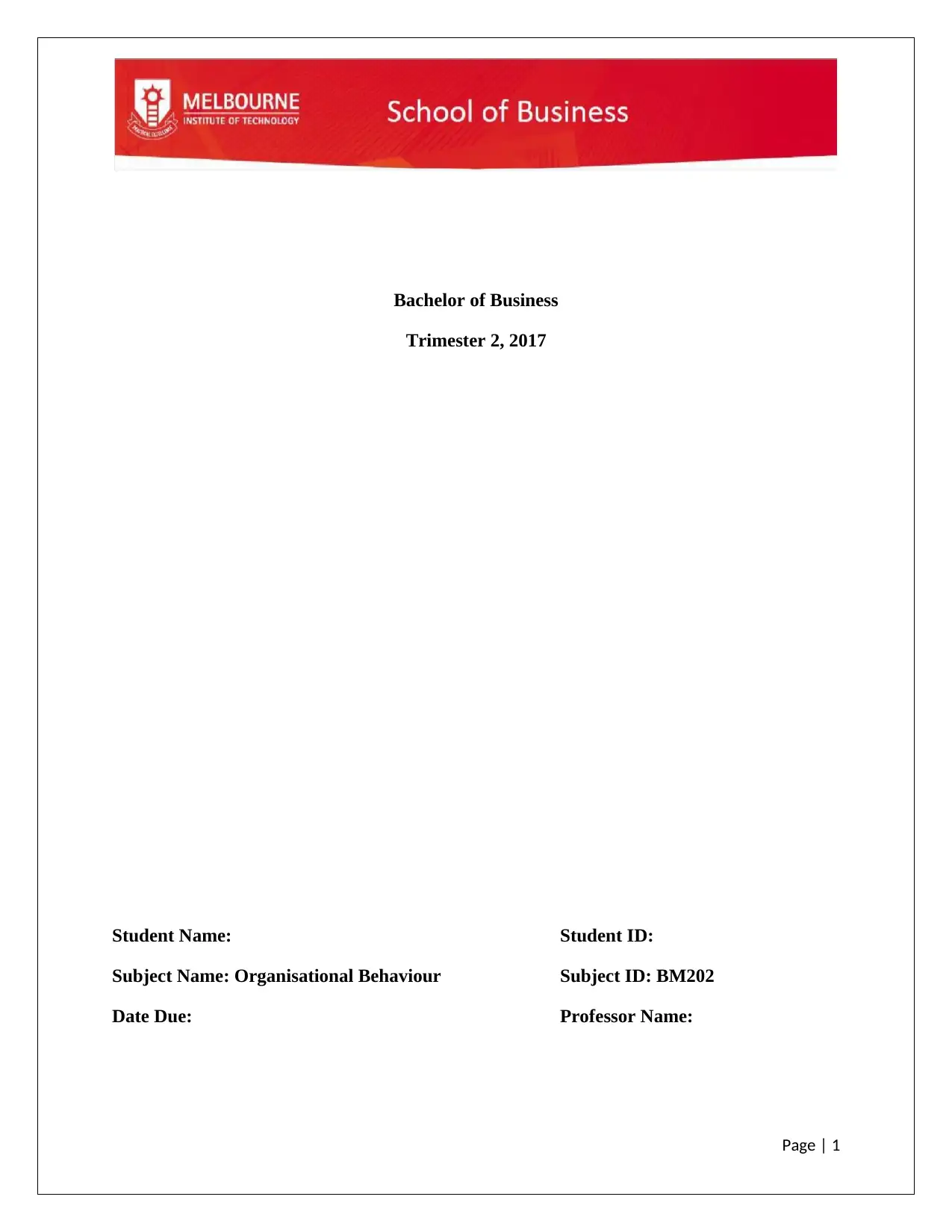
Bachelor of Business
Trimester 2, 2017
Student Name: Student ID:
Subject Name: Organisational Behaviour Subject ID: BM202
Date Due: Professor Name:
Page | 1
Trimester 2, 2017
Student Name: Student ID:
Subject Name: Organisational Behaviour Subject ID: BM202
Date Due: Professor Name:
Page | 1
Paraphrase This Document
Need a fresh take? Get an instant paraphrase of this document with our AI Paraphraser
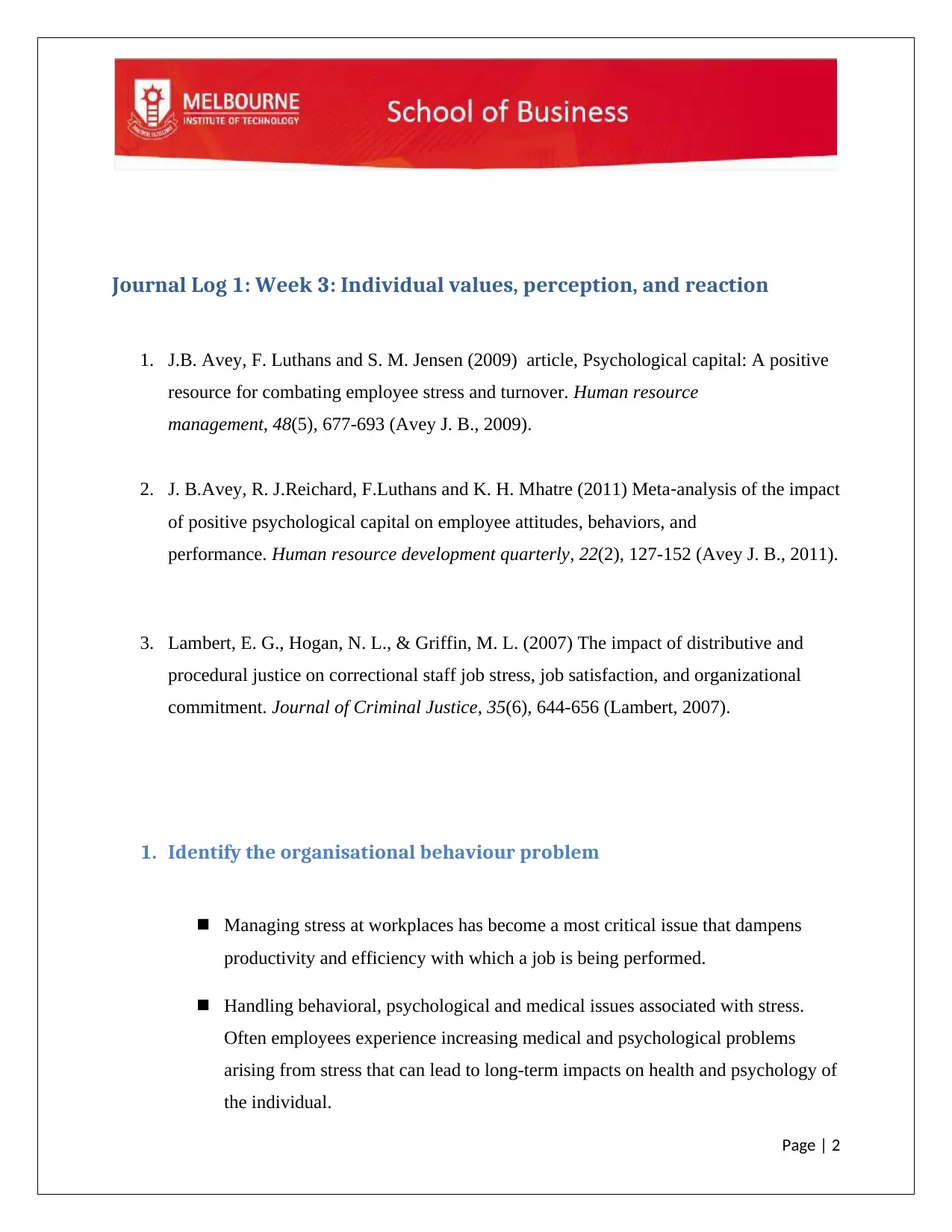
Journal Log 1: Week 3: Individual values, perception, and reaction
1. J.B. Avey, F. Luthans and S. M. Jensen (2009) article, Psychological capital: A positive
resource for combating employee stress and turnover. Human resource
management, 48(5), 677-693 (Avey J. B., 2009).
2. J. B.Avey, R. J.Reichard, F.Luthans and K. H. Mhatre (2011) Meta‐analysis of the impact
of positive psychological capital on employee attitudes, behaviors, and
performance. Human resource development quarterly, 22(2), 127-152 (Avey J. B., 2011).
3. Lambert, E. G., Hogan, N. L., & Griffin, M. L. (2007) The impact of distributive and
procedural justice on correctional staff job stress, job satisfaction, and organizational
commitment. Journal of Criminal Justice, 35(6), 644-656 (Lambert, 2007).
1. Identify the organisational behaviour problem
Managing stress at workplaces has become a most critical issue that dampens
productivity and efficiency with which a job is being performed.
Handling behavioral, psychological and medical issues associated with stress.
Often employees experience increasing medical and psychological problems
arising from stress that can lead to long-term impacts on health and psychology of
the individual.
Page | 2
1. J.B. Avey, F. Luthans and S. M. Jensen (2009) article, Psychological capital: A positive
resource for combating employee stress and turnover. Human resource
management, 48(5), 677-693 (Avey J. B., 2009).
2. J. B.Avey, R. J.Reichard, F.Luthans and K. H. Mhatre (2011) Meta‐analysis of the impact
of positive psychological capital on employee attitudes, behaviors, and
performance. Human resource development quarterly, 22(2), 127-152 (Avey J. B., 2011).
3. Lambert, E. G., Hogan, N. L., & Griffin, M. L. (2007) The impact of distributive and
procedural justice on correctional staff job stress, job satisfaction, and organizational
commitment. Journal of Criminal Justice, 35(6), 644-656 (Lambert, 2007).
1. Identify the organisational behaviour problem
Managing stress at workplaces has become a most critical issue that dampens
productivity and efficiency with which a job is being performed.
Handling behavioral, psychological and medical issues associated with stress.
Often employees experience increasing medical and psychological problems
arising from stress that can lead to long-term impacts on health and psychology of
the individual.
Page | 2
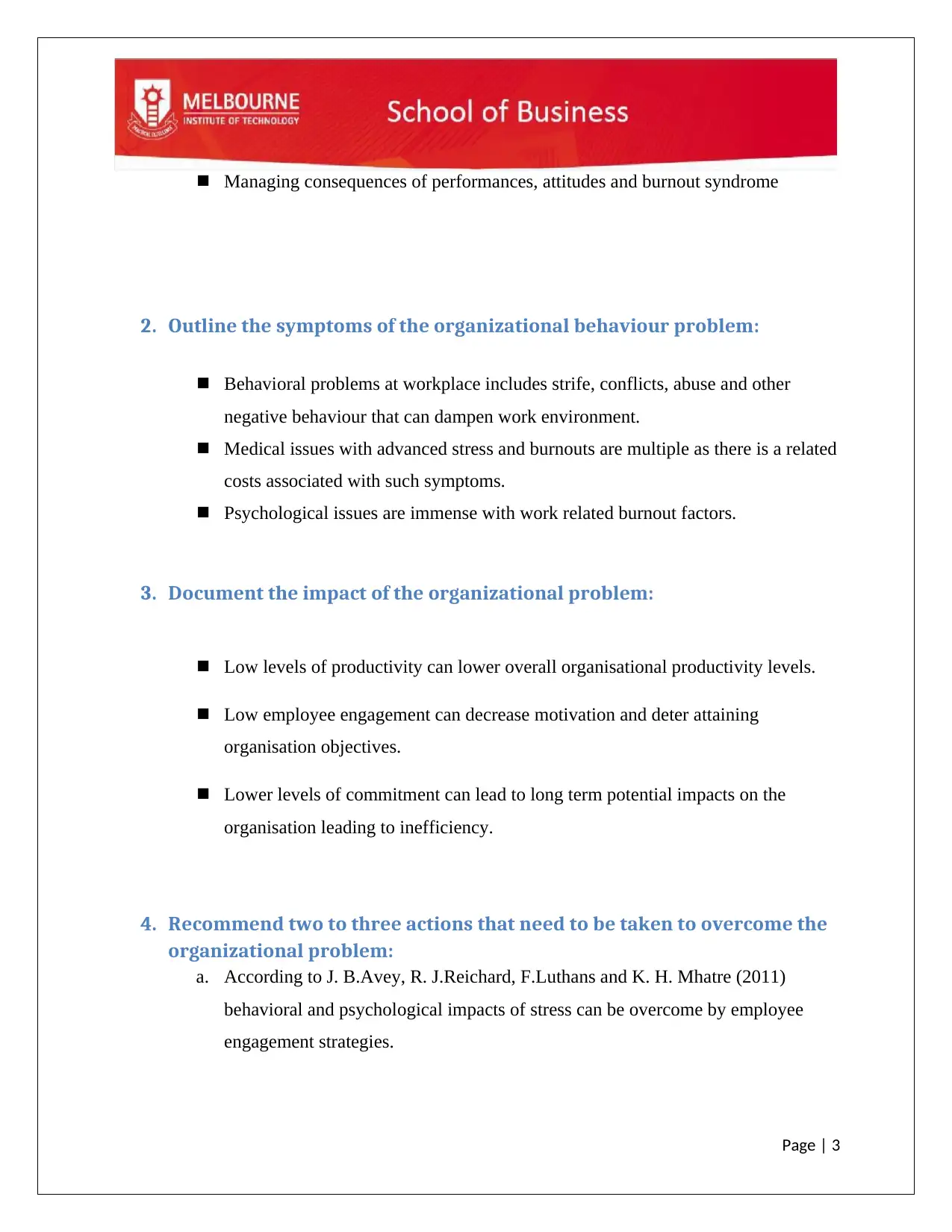
Managing consequences of performances, attitudes and burnout syndrome
2. Outline the symptoms of the organizational behaviour problem:
Behavioral problems at workplace includes strife, conflicts, abuse and other
negative behaviour that can dampen work environment.
Medical issues with advanced stress and burnouts are multiple as there is a related
costs associated with such symptoms.
Psychological issues are immense with work related burnout factors.
3. Document the impact of the organizational problem:
Low levels of productivity can lower overall organisational productivity levels.
Low employee engagement can decrease motivation and deter attaining
organisation objectives.
Lower levels of commitment can lead to long term potential impacts on the
organisation leading to inefficiency.
4. Recommend two to three actions that need to be taken to overcome the
organizational problem:
a. According to J. B.Avey, R. J.Reichard, F.Luthans and K. H. Mhatre (2011)
behavioral and psychological impacts of stress can be overcome by employee
engagement strategies.
Page | 3
2. Outline the symptoms of the organizational behaviour problem:
Behavioral problems at workplace includes strife, conflicts, abuse and other
negative behaviour that can dampen work environment.
Medical issues with advanced stress and burnouts are multiple as there is a related
costs associated with such symptoms.
Psychological issues are immense with work related burnout factors.
3. Document the impact of the organizational problem:
Low levels of productivity can lower overall organisational productivity levels.
Low employee engagement can decrease motivation and deter attaining
organisation objectives.
Lower levels of commitment can lead to long term potential impacts on the
organisation leading to inefficiency.
4. Recommend two to three actions that need to be taken to overcome the
organizational problem:
a. According to J. B.Avey, R. J.Reichard, F.Luthans and K. H. Mhatre (2011)
behavioral and psychological impacts of stress can be overcome by employee
engagement strategies.
Page | 3
⊘ This is a preview!⊘
Do you want full access?
Subscribe today to unlock all pages.

Trusted by 1+ million students worldwide

b. E, G. Lambert, N.L. Hogan and M.L. Griffin (2007) recommends an
organisational culture that can foster healthy work ambience.
c. J. B.Avey, F. Luthans and S.M. Jensen (2009) provides a psychological
framework of strategies that can help avoid medical issues associated with stress,
along with its consequences.
Journal Log 2: Week 4- Motivating Behaviours
1. M. Wong, E. Gardiner, W. Lang and L. Coulon (2008) article Generational differences in
personality and motivation: do they exist and what are the implications for the
workplace?. Journal of Managerial Psychology, 23(8), 878-890 (Wong, 2008).
2. T. Herath and H.R. Rao (2009) article Protection motivation and deterrence: a framework
for security policy compliance in organisations. European Journal of Information
Systems, 18(2), 106-125 (Herath, 2009).
3. A. Tella, C.O. Ayeni, and S.O. Popoola (2007) Work motivation, job satisfaction, and
organisational commitment of library personnel in academic and research libraries in Oyo
State, Nigeria. Library Philosophy and Practice (e-journal), 118 (Tella, 2007).
Page | 4
organisational culture that can foster healthy work ambience.
c. J. B.Avey, F. Luthans and S.M. Jensen (2009) provides a psychological
framework of strategies that can help avoid medical issues associated with stress,
along with its consequences.
Journal Log 2: Week 4- Motivating Behaviours
1. M. Wong, E. Gardiner, W. Lang and L. Coulon (2008) article Generational differences in
personality and motivation: do they exist and what are the implications for the
workplace?. Journal of Managerial Psychology, 23(8), 878-890 (Wong, 2008).
2. T. Herath and H.R. Rao (2009) article Protection motivation and deterrence: a framework
for security policy compliance in organisations. European Journal of Information
Systems, 18(2), 106-125 (Herath, 2009).
3. A. Tella, C.O. Ayeni, and S.O. Popoola (2007) Work motivation, job satisfaction, and
organisational commitment of library personnel in academic and research libraries in Oyo
State, Nigeria. Library Philosophy and Practice (e-journal), 118 (Tella, 2007).
Page | 4
Paraphrase This Document
Need a fresh take? Get an instant paraphrase of this document with our AI Paraphraser
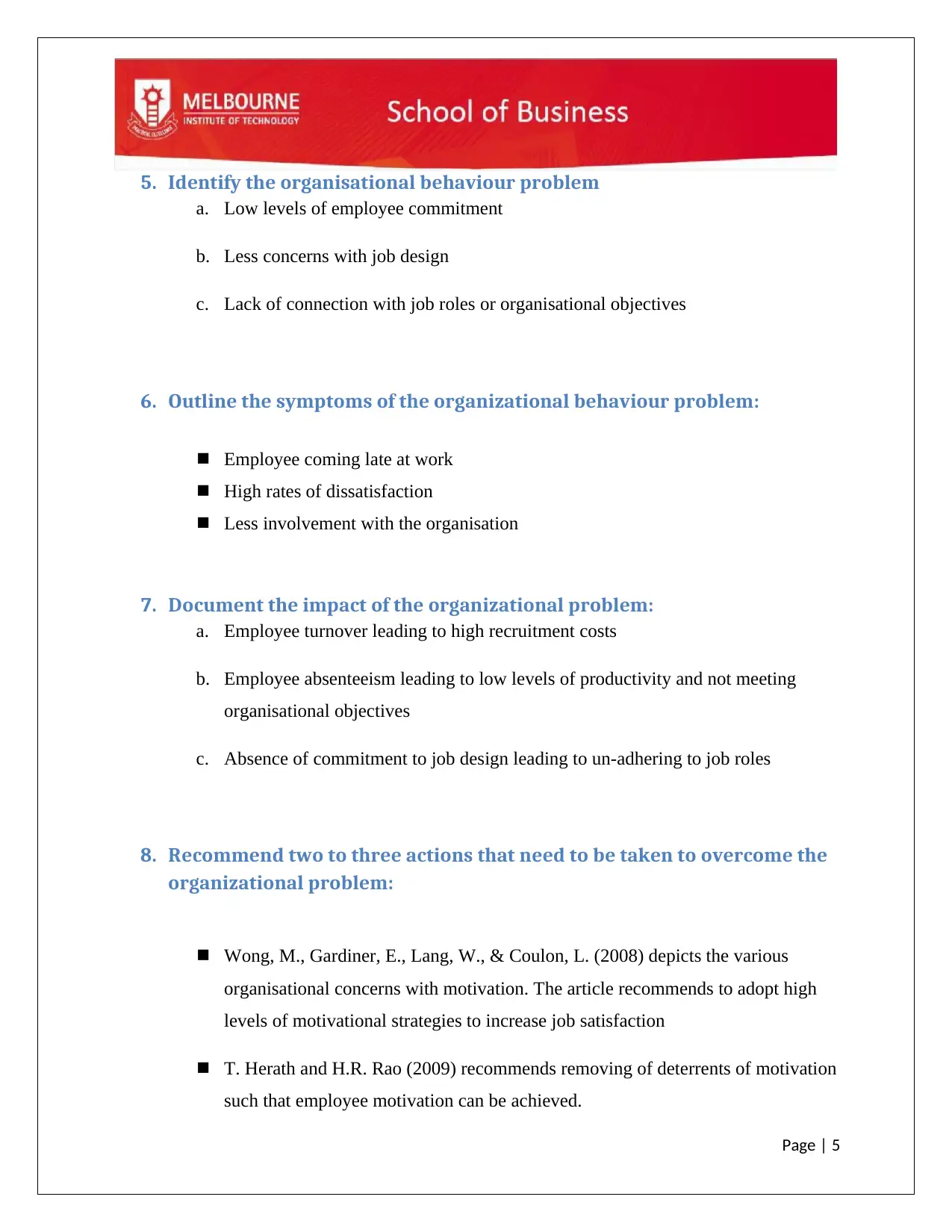
5. Identify the organisational behaviour problem
a. Low levels of employee commitment
b. Less concerns with job design
c. Lack of connection with job roles or organisational objectives
6. Outline the symptoms of the organizational behaviour problem:
Employee coming late at work
High rates of dissatisfaction
Less involvement with the organisation
7. Document the impact of the organizational problem:
a. Employee turnover leading to high recruitment costs
b. Employee absenteeism leading to low levels of productivity and not meeting
organisational objectives
c. Absence of commitment to job design leading to un-adhering to job roles
8. Recommend two to three actions that need to be taken to overcome the
organizational problem:
Wong, M., Gardiner, E., Lang, W., & Coulon, L. (2008) depicts the various
organisational concerns with motivation. The article recommends to adopt high
levels of motivational strategies to increase job satisfaction
T. Herath and H.R. Rao (2009) recommends removing of deterrents of motivation
such that employee motivation can be achieved.
Page | 5
a. Low levels of employee commitment
b. Less concerns with job design
c. Lack of connection with job roles or organisational objectives
6. Outline the symptoms of the organizational behaviour problem:
Employee coming late at work
High rates of dissatisfaction
Less involvement with the organisation
7. Document the impact of the organizational problem:
a. Employee turnover leading to high recruitment costs
b. Employee absenteeism leading to low levels of productivity and not meeting
organisational objectives
c. Absence of commitment to job design leading to un-adhering to job roles
8. Recommend two to three actions that need to be taken to overcome the
organizational problem:
Wong, M., Gardiner, E., Lang, W., & Coulon, L. (2008) depicts the various
organisational concerns with motivation. The article recommends to adopt high
levels of motivational strategies to increase job satisfaction
T. Herath and H.R. Rao (2009) recommends removing of deterrents of motivation
such that employee motivation can be achieved.
Page | 5
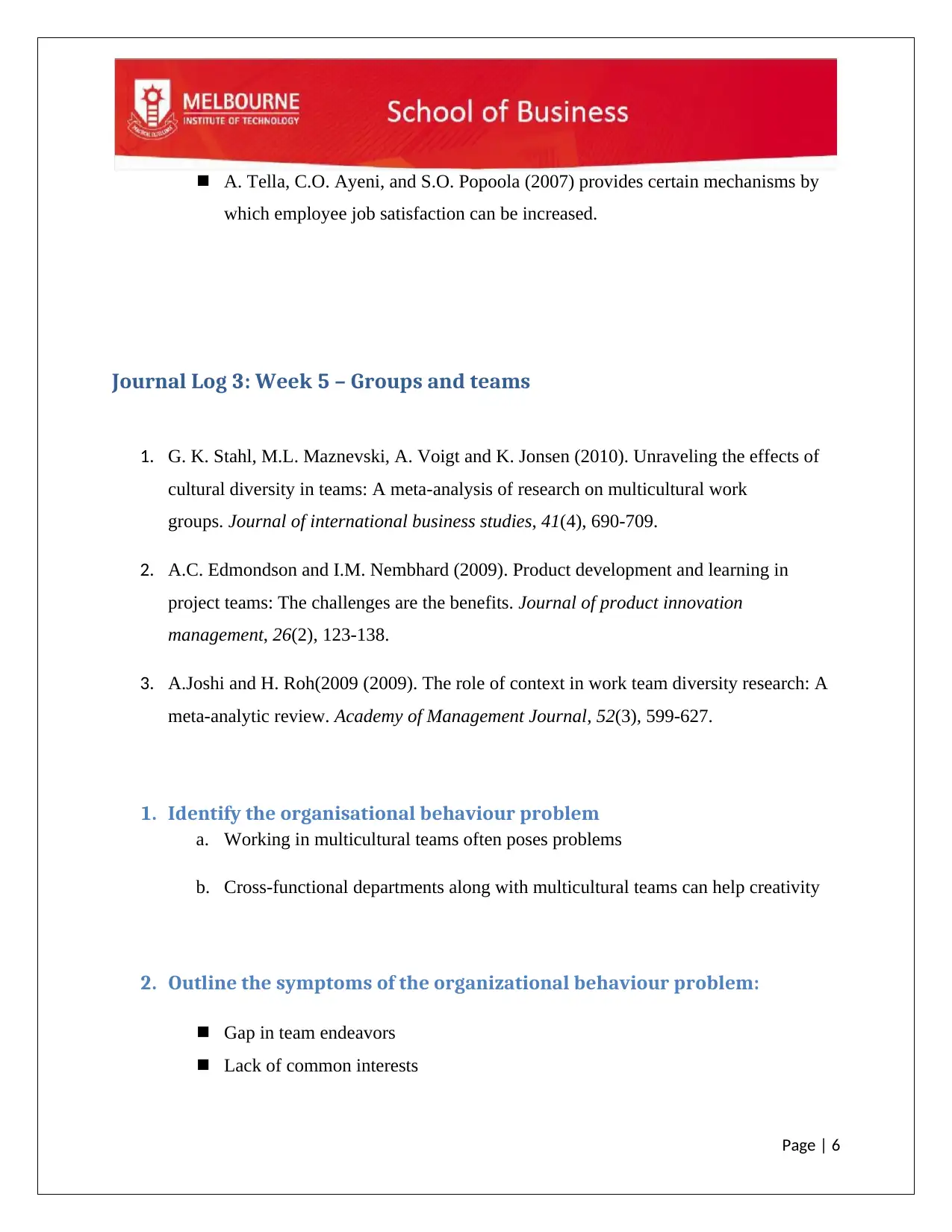
A. Tella, C.O. Ayeni, and S.O. Popoola (2007) provides certain mechanisms by
which employee job satisfaction can be increased.
Journal Log 3: Week 5 – Groups and teams
1. G. K. Stahl, M.L. Maznevski, A. Voigt and K. Jonsen (2010). Unraveling the effects of
cultural diversity in teams: A meta-analysis of research on multicultural work
groups. Journal of international business studies, 41(4), 690-709.
2. A.C. Edmondson and I.M. Nembhard (2009). Product development and learning in
project teams: The challenges are the benefits. Journal of product innovation
management, 26(2), 123-138.
3. A.Joshi and H. Roh(2009 (2009). The role of context in work team diversity research: A
meta-analytic review. Academy of Management Journal, 52(3), 599-627.
1. Identify the organisational behaviour problem
a. Working in multicultural teams often poses problems
b. Cross-functional departments along with multicultural teams can help creativity
2. Outline the symptoms of the organizational behaviour problem:
Gap in team endeavors
Lack of common interests
Page | 6
which employee job satisfaction can be increased.
Journal Log 3: Week 5 – Groups and teams
1. G. K. Stahl, M.L. Maznevski, A. Voigt and K. Jonsen (2010). Unraveling the effects of
cultural diversity in teams: A meta-analysis of research on multicultural work
groups. Journal of international business studies, 41(4), 690-709.
2. A.C. Edmondson and I.M. Nembhard (2009). Product development and learning in
project teams: The challenges are the benefits. Journal of product innovation
management, 26(2), 123-138.
3. A.Joshi and H. Roh(2009 (2009). The role of context in work team diversity research: A
meta-analytic review. Academy of Management Journal, 52(3), 599-627.
1. Identify the organisational behaviour problem
a. Working in multicultural teams often poses problems
b. Cross-functional departments along with multicultural teams can help creativity
2. Outline the symptoms of the organizational behaviour problem:
Gap in team endeavors
Lack of common interests
Page | 6
⊘ This is a preview!⊘
Do you want full access?
Subscribe today to unlock all pages.

Trusted by 1+ million students worldwide
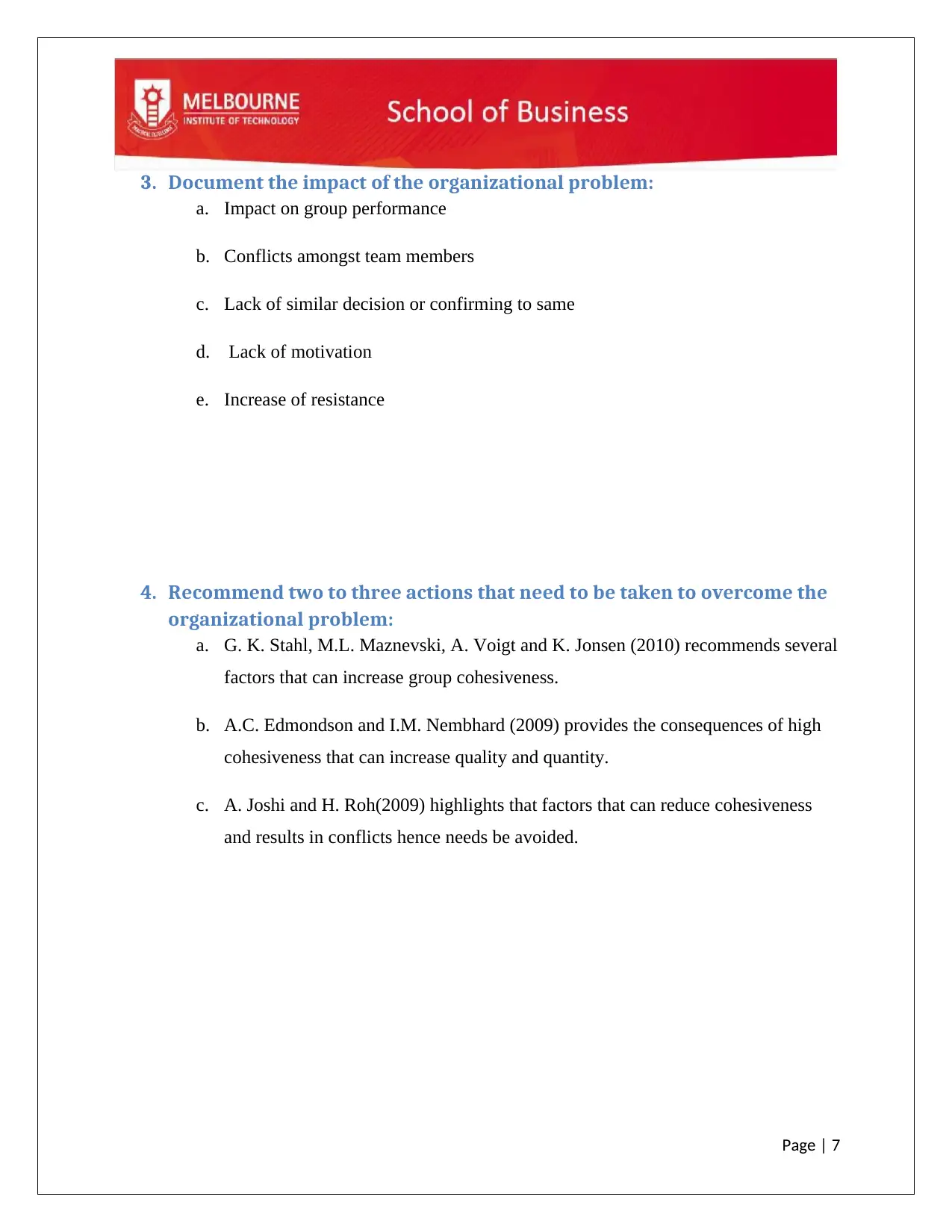
3. Document the impact of the organizational problem:
a. Impact on group performance
b. Conflicts amongst team members
c. Lack of similar decision or confirming to same
d. Lack of motivation
e. Increase of resistance
4. Recommend two to three actions that need to be taken to overcome the
organizational problem:
a. G. K. Stahl, M.L. Maznevski, A. Voigt and K. Jonsen (2010) recommends several
factors that can increase group cohesiveness.
b. A.C. Edmondson and I.M. Nembhard (2009) provides the consequences of high
cohesiveness that can increase quality and quantity.
c. A. Joshi and H. Roh(2009) highlights that factors that can reduce cohesiveness
and results in conflicts hence needs be avoided.
Page | 7
a. Impact on group performance
b. Conflicts amongst team members
c. Lack of similar decision or confirming to same
d. Lack of motivation
e. Increase of resistance
4. Recommend two to three actions that need to be taken to overcome the
organizational problem:
a. G. K. Stahl, M.L. Maznevski, A. Voigt and K. Jonsen (2010) recommends several
factors that can increase group cohesiveness.
b. A.C. Edmondson and I.M. Nembhard (2009) provides the consequences of high
cohesiveness that can increase quality and quantity.
c. A. Joshi and H. Roh(2009) highlights that factors that can reduce cohesiveness
and results in conflicts hence needs be avoided.
Page | 7
Paraphrase This Document
Need a fresh take? Get an instant paraphrase of this document with our AI Paraphraser

Reference Lists
Avey, J. B. (2009). Psychological capital: A positive resource for combating employee stress and
turnover. Human resource management, 677-693.
Avey, J. B. (2011). Meta‐analysis of the impact of positive psychological capital on employee
attitudes, behaviors, and performance. Human resource development quarterly, 127-152.
Edmondson, A. C. (2009). Product development and learning in project teams: The challenges
are the benefits. . Journal of product innovation management, 123-138.
Herath, T. &. (2009). Protection motivation and deterrence: a framework for security policy
compliance in organisations. European Journal of Information Systems, 106-125.
Joshi, A. &. (2009). The role of context in work team diversity research: A meta-analytic review.
Academy of Management Journal, 599-627.
Lambert, E. G. (2007). The impact of distributive and procedural justice on correctional staff job
stress, job satisfaction, and organizational commitment. Journal of Criminal Justice, 644-
656.
Stahl, G. K. (2010). Unraveling the effects of cultural diversity in teams: A meta-analysis of
research on multicultural work groups. Journal of international business studies, 690-
709.
Tella, A. A. (2007). Work motivation, job satisfaction, and organisational commitment of library
personnel in academic and research libraries in Oyo State, Nigeria. Library Philosophy
and Practice (e-journal), 118.
Page | 8
Avey, J. B. (2009). Psychological capital: A positive resource for combating employee stress and
turnover. Human resource management, 677-693.
Avey, J. B. (2011). Meta‐analysis of the impact of positive psychological capital on employee
attitudes, behaviors, and performance. Human resource development quarterly, 127-152.
Edmondson, A. C. (2009). Product development and learning in project teams: The challenges
are the benefits. . Journal of product innovation management, 123-138.
Herath, T. &. (2009). Protection motivation and deterrence: a framework for security policy
compliance in organisations. European Journal of Information Systems, 106-125.
Joshi, A. &. (2009). The role of context in work team diversity research: A meta-analytic review.
Academy of Management Journal, 599-627.
Lambert, E. G. (2007). The impact of distributive and procedural justice on correctional staff job
stress, job satisfaction, and organizational commitment. Journal of Criminal Justice, 644-
656.
Stahl, G. K. (2010). Unraveling the effects of cultural diversity in teams: A meta-analysis of
research on multicultural work groups. Journal of international business studies, 690-
709.
Tella, A. A. (2007). Work motivation, job satisfaction, and organisational commitment of library
personnel in academic and research libraries in Oyo State, Nigeria. Library Philosophy
and Practice (e-journal), 118.
Page | 8
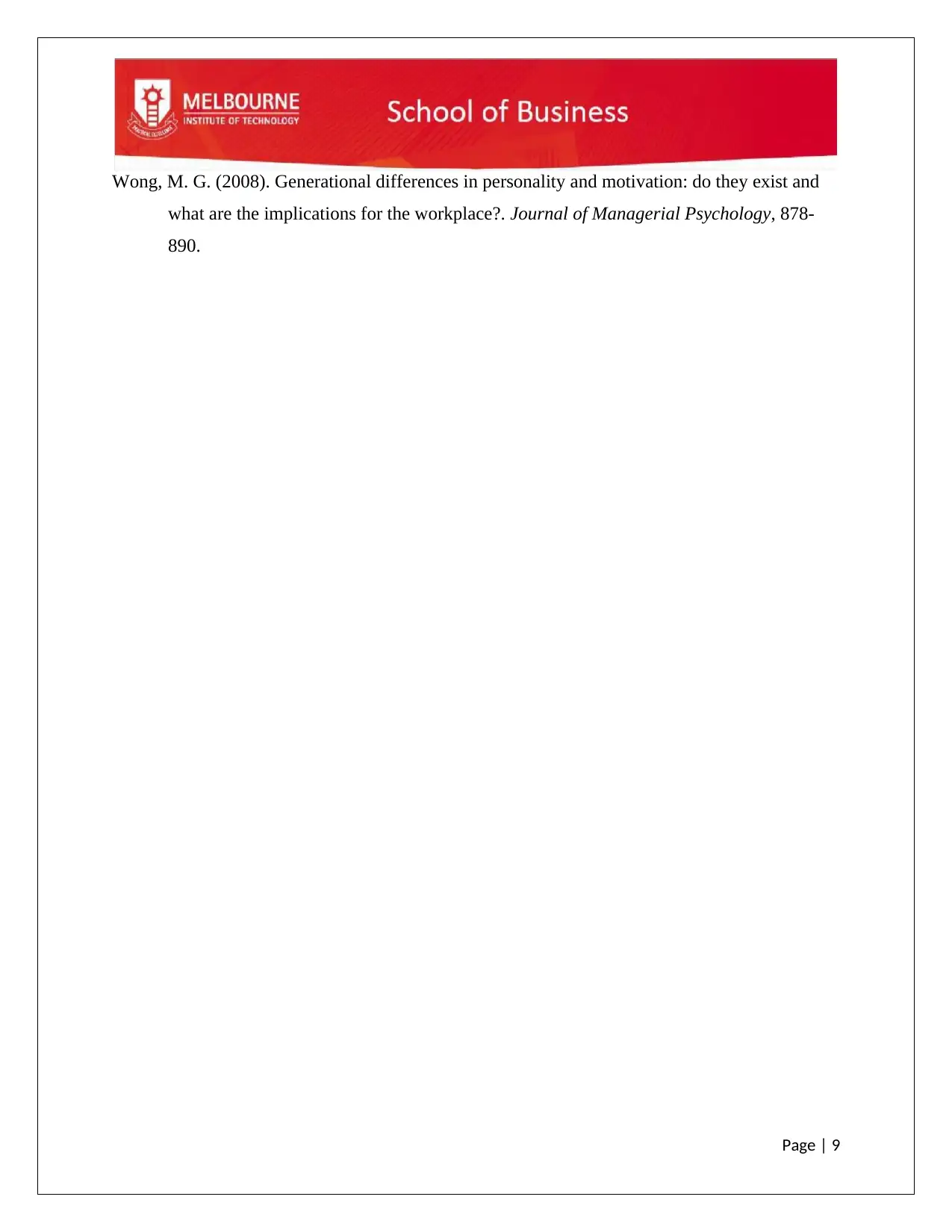
Wong, M. G. (2008). Generational differences in personality and motivation: do they exist and
what are the implications for the workplace?. Journal of Managerial Psychology, 878-
890.
Page | 9
what are the implications for the workplace?. Journal of Managerial Psychology, 878-
890.
Page | 9
⊘ This is a preview!⊘
Do you want full access?
Subscribe today to unlock all pages.

Trusted by 1+ million students worldwide
1 out of 9
Your All-in-One AI-Powered Toolkit for Academic Success.
+13062052269
info@desklib.com
Available 24*7 on WhatsApp / Email
![[object Object]](/_next/static/media/star-bottom.7253800d.svg)
Unlock your academic potential
Copyright © 2020–2026 A2Z Services. All Rights Reserved. Developed and managed by ZUCOL.
